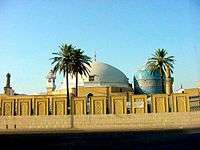Ahmet Kayhan Dede
| Ahmet Kayhan Dede | |
|---|---|
| Born |
1898 Pütürge, Malatya, Turkey |
| Died | August 3, 1998 |
| Religion | Islam |
Ahmet Kayhan Dede (1898, Pütürge, Malatya – August 3, 1998) was a Turkish Sufi master of the 20th century and an important figure in Islamic Mysticism.
Early history
Ahmet Kayhan was born in the Aktarlar (Mako) village of Malatya Province, Turkey in early 1898, although the Turkish government lists his official year of birth as 1905. His father died when he was a child, and his mother in his early youth. For some years he stayed with an aunt.
Kayhan first met "Keko" (Ahmet Kaya Efendi), the man that would become his master, when he was only four or five years old. But his true discipleship began in his early twenties.
Adult life
By 1922 Kayhan was living in Istanbul, making routine trips to the cities of Ankara and Malatya. In 1936 he relocated to Ankara, where he met Hajar, whom he would marry on March 25, 1937. His longtime master Ahmet Efendi died in 1944. Musa Kâzim Ağel, who had the same Master as Ahmet Kaya, continued to teach until his own death in 1967. After this, it was Ahmet Kayhan’s turn. He also gained the title "Dede", which actually means "Grandpa" and is appended to the name as an expression of loving respect as is customary towards elder relatives.
Ahmet Kayhan spent the rest of his life in Ankara, teaching and enlightening those around him and the many disciples that came to visit him from the 1960s on.
Line of descent
Master Kayhan's chain of transmission is traced through the Prophet Muhammad, his close associate Abu Bakr, Abdul-Qadir Gilani, Baha-ud-Din Naqshband Bukhari, Ahmad Sirhindi, Abdullah Dehlewi, Hadhrat Mawlânâ Khâlid-i Baghdâdî, Sheikh Samini, Osman Badruddin and Ahmet Kayhan Dede.
Vision of World Peace
Master Kayhan foresaw that nuclear/biological/chemical (NBC) weapons of mass destruction (WMDs), but basically nuclear ones, would bring about the end of humanity. To avert this cataclysm, he issued calls to world peace in the 1980s and 90s. One of these, An Invitation to Peace (1987), won widespread acclaim, among others from the Russian premier Gorbachev, the Vatican, the French president, as well as both the president and prime minister of Israel.
Quotes
″Allah (God), (with your sincerely)
Let us bring peace to everywhere we go. Let us be uniters rather than dividers. Let us bring love where there is hate settled in. To the place where there is injury let us bring forgiveness and remedy.
Let us, Bring belief & faith where there is doubt settled in. Bring hope where there is no hope left. Bring light where there is darkness.
And let us (with your sincerely) allow to spread happiness where there is sadness.
Allah (God)!
Make me a person who hides other’s faults instead of revealing Make me a person who consoles (relieves) others instead of asking (needing) for one Make me a person who is tolerating instead of being tolerated by others Help us for not only ask to be loved but at the same time, wants to love.
Likewise rain, make me a person who don’t hesitate to rain on everywhere equally, and bring liveness to everywhere it drops.
Make me a person,
Like the sun, who doesn’t hesitate to light all the living things with it brightness.
Like a soil, who doesn’t hesitate to share all the goods grown in him with everyone, even though it is being stepped on every time.
Let us join to the path that embraces ones who;
Have hands that give (share) instead of take,
Who is forgiven, because they learn to forgive,
Who born with - live for - and die with the belief of Allah (God),
and let us join the ones who reborn in the infinitive life.″
Books by Ahmet Kayhan
All books by Ahmet Kayhan were in the Turkish language.
- Âdem ve Âlem (“Man and Universe”) (1989)
- Ruh ve Beden (“Spirit and Body”) (1991)
- Aradığımı Buldum (“I Found What I Was Looking For”) (1992)
- İrfan Okulunda Oku (“Study in the School of Wisdom”) (1994)
These books are anthologies of essays, poems, book excerpts and condensed books. A selection from these in English can be found in Henry Bayman's The Meaning of the Four Books.
Books about Ahmet Kayhan
The Biography of Ahmet Kayhan is written by Henry Bayman: The Teachings of a Perfect Master: An Islamic Saint for the Third Millennium published in 2012 by Anqa Publishing, ISBN 190593744X.
Other books published posthumously about Ahmet Kayhan and his teachings are:
- Hacı Ahmet Kayhan: Sohbetler (Kayhan Berişler et al., 2011, revised and expanded from an earlier 2007 edition). This is basically a transcription of the Master’s Friday discourses.
- Ayşe Serap Avanoğlu, Veiled Islam: A Deconstructive Sufi Formation, Unpublished Master’s thesis submitted to METU Dept. of Social Anthropology, 2012. Deals with an educated urban middle-class cross-section of the Master’s disciples.
- Henry Bayman, The Station of No Station: Open Secrets of the Sufis (2001) North Atlantic Books. ISBN 1556432402
- Henry Bayman, The Secret of Islam: Love and Law in the Religion of Ethics (2003) North Atlantic Books. ISBN 1556434324
- Henry Bayman, The Black Pearl: Spiritual Illumination In Sufism and East Asian Philosophies (2005) Monkfish Book Publishing. ISBN 0974935956
See also
External links
- AhmetKayhan.com
- The Flawless Human Being English biography written by Henry Bayman
- Official Website of Henry Bayman Student of Ahmet Kayhan Dede
- The Meaning of the Four Books by Henry Bayman Online Edition
